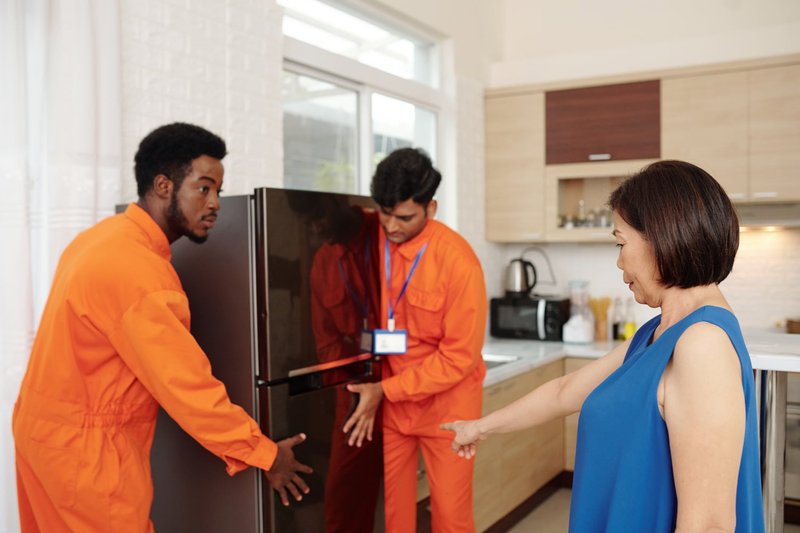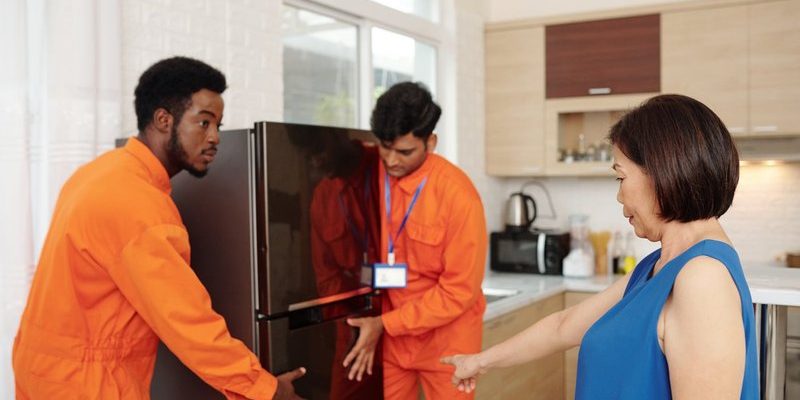
Here’s the thing: appliance registration isn’t just paperwork. It can unlock handy things, like warranty support, software updates, or even a hotline for troubleshooting. But when the purchase was made by someone else—your landlord—the whole process feels a little fuzzier. Let me explain how this works, why it matters, and where tenants stand with Samsung kitchen appliances in a rented space.
What Does Appliance Registration Even Mean?
First, let’s slow it down and talk about *why* registration matters. When you register a Samsung kitchen appliance, you’re basically telling the manufacturer, “Hey, I’m the person using this fridge, dishwasher, or stove now.” It’s a bit like pairing your phone with a new Bluetooth speaker: you’re making a connection so you can get the benefits—think support, warranty coverage, and faster help if things ever go wrong.
But this isn’t just a Samsung thing. Most major brands want you to register right after purchase, using a unique code or serial number found on the unit or its paperwork. Samsung, in particular, sometimes requests extra details—like purchase date, model number, and proof of ownership. That’s where the process can feel tricky for tenants, because you aren’t the person who paid for the appliance, and you might not have all the original info handy.
Honestly, registration helps everyone in the long run. It’s not a sneaky way to track you; it’s more like syncing up, so if your dishwasher’s brain ever needs a reset, Samsung knows exactly which model and version you’re dealing with.
Do Tenants Have the Right to Register Landlord-Owned Appliances?
You might be wondering, “Can I just register my landlord’s Samsung fridge as if it’s mine?” Here’s the catch: *technically*, registration is meant for the owner of the appliance—the person who bought and installed it. In rental homes and apartments, that’s usually the landlord. Samsung’s terms will often say the “purchaser” gets warranty rights, and that’s not always the person living there.
But real life isn’t always strict. Many tenants, especially those staying for years, go ahead and register appliances in their own name, just to make service calls smoother or to get helpful updates. Sometimes, landlords even *ask* you to do it, since you’re the one using and maintaining the equipment day-to-day. It’s not against Samsung’s registration process to submit your own contact info, but if claims or warranty repairs come up, they’ll probably want to talk to the owner—the landlord—before approving anything big.
The biggest sticking point? If there’s ever a dispute—like who’s paying for a repair, or whether something broke from normal use—Samsung will usually side with their records. So, while tenants can often *try* to register the appliance, *official warranty rights* usually stick with the landlord unless they pass those rights to you directly.
Why Would Tenants Want to Register Samsung Kitchen Appliances?
Let’s be real: most renters don’t dream about filling out online forms for their oven or fridge. But there are actually good reasons to do it—even if you’re not the owner.
- Quick support: Registered users can sometimes schedule repairs faster, and troubleshooting by phone is way easier when Samsung has your info on file.
- Safety notices and updates: If Samsung issues a recall or sends out new software (yes, smart fridges have updates!), registered users get notified first.
- Proof for insurance claims: If there’s ever a fire or flood, being registered sometimes helps convince your renters’ insurance that you took care of the appliances.
Say your Samsung dishwasher starts acting up—the kind of issue that just makes dishes look sad, not broken. Registering lets you pull up specific support docs or even connect the appliance’s “smart” features to your phone if it’s enabled. It’s about making your life simpler, not just jumping through hoops. Plus, for smart Samsung appliances, registration might be *required* for syncing with their connected home apps.
The Registration Process: Step-by-Step for Tenants
If you’re ready to give it a shot—maybe your landlord’s fine with it, or you just want better support—here’s how tenants can register Samsung kitchen appliances, even if you didn’t buy them yourself.
- Find the serial and model number: Usually, these are on a label inside the fridge, on the side of the oven door, or behind the dishwasher panel.
- Head to Samsung’s registration page: Samsung asks for basic info: your contact details, the appliance model, the serial number, and the purchase date.
- Upload proof of purchase (if possible): This is where tenants stumble. If you don’t have the original receipt, try to get it from your landlord. If not, some registrations still go through—just with limited warranty rights.
- Submit your info: Samsung will usually confirm by email. If something’s off, they might ask for more details or proof of ownership.
Here’s a tip: If you’re stuck, call Samsung’s support line. Be honest about your situation—they’ll tell you what’s possible for tenants, and if you’re allowed to sync the appliance with smart home apps using your account.
Landlord-Tenant Communication: Why It’s Key
Let me be blunt: *Always* talk to your landlord first before registering major appliances. Some landlords want to handle all registrations themselves—after all, they’re protecting their investment and want warranty claims in their own name. Others are happy to let tenants manage things, especially if it saves them the headache of tech support calls.
The best approach? Send a quick email or call, and explain that you’d like to register the Samsung kitchen appliance for maintenance, troubleshooting, and possible software updates. Most landlords will be fine with this, but if they prefer to do it themselves, respect their choice—after all, they’re ultimately responsible if things go sideways.
If you do register, offer to share the account info or confirmation number with your landlord. That way, everyone’s in the loop, and you avoid messy “he said, she said” fights if something breaks or needs pairing with a new phone or remote.
Warranty and Service Implications for Tenants
So, what actually happens if your Samsung cooktop starts misbehaving—and you’ve registered it in your own name? Here’s where things get a little gray. While registration can help with basic troubleshooting and support, Samsung’s official warranty stays tied to the *original purchaser*—that’s usually the landlord. If you try to claim a free repair or replacement, don’t be surprised if Samsung asks for the landlord’s approval, or even the original receipt.
This doesn’t mean you’re totally out of luck. In many cases, Samsung will still guide you through basic resets, code errors, or advice for syncing and maintaining the appliance. They might even schedule a service visit, but chances are, they’ll want the landlord to sign off before expensive parts get swapped.
For high-tech, smart-enabled kitchen appliances, warranty and software access can get complicated if the device is synced to the landlord’s Samsung account. Sometimes, you’ll need the landlord to “reset” or “pair” the appliance before you can connect it with your phone or account. Again, communication is everything here—it can save a lot of headache and prevent accidental lockouts.
Alternatives: What If You Can’t Register?
If your landlord says “no” or Samsung’s system just doesn’t let you register, don’t panic. You’ve still got options for getting the most out of your Samsung kitchen appliances.
- Use guest or shared accounts: Some smart appliances let you pair multiple users, so you can get updates and control without changing the main owner info.
- Rely on landlord registration: Ask your landlord to forward important warnings, updates, or service reminders to you.
- Keep basic info handy: Save appliance serial numbers, model names, and troubleshooting tips in case something needs a quick reset or code lookup.
Honestly, while you might not get every perk as a tenant, you can still keep your kitchen humming. And when batteries run low in remotes or you need to reset a stubborn fridge, knowing the brand and model helps a ton—even if you’re not officially registered as the owner.
Comparing Tenant Registration: Samsung vs Other Brands
Let’s zoom out for a second—how does Samsung stack up against other appliance brands when it comes to tenant registration? In my experience, Samsung is about average. Some brands are super strict, rejecting any registration that doesn’t exactly match the original purchase info. Others, like certain universal appliance makers, don’t care who registers as long as the serial number matches.
Samsung’s setup is a bit like a smart home remote: if you can pair it, you can often use it, but warranty claims always come back to the registered purchaser. For day-to-day troubleshooting, resets, or syncing with smart home apps, Samsung usually lets tenants join the party, provided you’re transparent and willing to jump through a hoop or two.
If you’re working with universal remotes or third-party appliance controllers, things can be looser—just pair them with your phone and you’re good to go. But **brand registration, especially for warranty coverage, almost always sticks with the original owner.**
Final Thoughts: What Tenants Should Remember
Wrapping it up, here’s the big idea: while tenants *can* often register Samsung kitchen appliances purchased by landlords, it comes with a few caveats. You might not get full warranty rights, and you’ll always want to check with your landlord before making changes. Still, registration can make maintenance and troubleshooting way easier—especially as Samsung keeps rolling out smarter, more connected kitchen gadgets.
In a rental, consider registration a tool for smoother living, not an ownership claim. Keep communication open, know your boundaries, and use the resources available. That way, whether you’re resetting a synced fridge or calling in for service, you’re ready—and your landlord will thank you for keeping things running smoothly.
